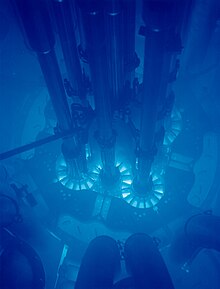Cherenkov radiation (/tʃəˈrɛŋkɒf/;[1] Russian: Черенков) is electromagnetic radiation emitted when a charged particle (such as an electron) passes through a dielectric medium at a speed greater than the phase velocity (speed of propagation of a wave in a medium) of light in that medium. A classic example of Cherenkov radiation is the characteristic blue glow of an underwater nuclear reactor. Its cause is similar to the cause of a sonic boom, the sharp sound heard when faster-than-sound movement occurs. The phenomenon is named after Soviet physicist Pavel Cherenkov, who shared the 1958 Nobel Prize in Physics for its discovery.
Cherenkov radiation glowing in the core of the Advanced Test Reactor.
https://en.wikipedia.org/wiki/Cherenkov_radiation

No comments:
Post a Comment